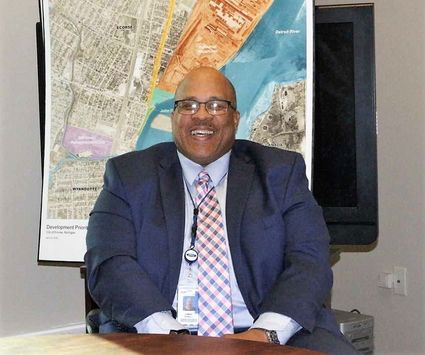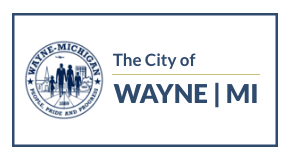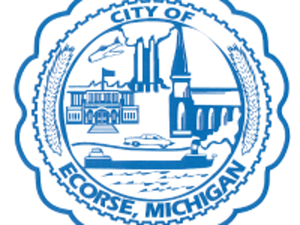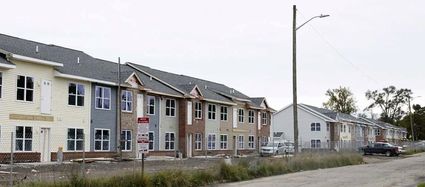Ecorse Tackles the Problem of Blight with New Development
November 1, 2018
Ecorse Mayor Lamar Tidwell grew up in Ecorse. He remembers when the city was an attractive place to live and do business. Tidwell remembers from his younger days that when homes were put up for sale, they always sold quickly. Such homes were well-kept, the lawns were cared for, and the exterior of the property was clean. But Mayor Tidwell says he sees a different Ecorse today.
Tidwell says a number of factors play into the state of the city's appearance today. He says homeowners in both Ecorse and River Rouge were largely dependent on jobs with the manufacturing giant, U.S. Steel. He estimates that up to 20 percent of employees of the steelmaker resided in either of the two communities. But as technological advances have made their way into American manufacturing, such companies have relied less on human work power. The result was company downsizing and lost jobs.
Another factor Tidwell identifies is a surge in rental properties and the city's negligence at enforcing its own housing ordinances. The result was both business owners and homeowners who were casual about the upkeep of a property which they did not own.
Then came the recession of 2008. Both employment and the housing industry took a hit. Families began leaving the region, in search of jobs elsewhere. Some sold their homes, some walked away from a financial responsibility they could no longer commit to. As a result, the number of abandoned and boarded-up homes throughout the city increased as years of recovery went by.
The recovery was slow, and while many fresh college graduates took their newfound skills to other part of the country, some remained in this region they call home.
Following a college education at Kent State University, Tidwell came home to Ecorse to serve on its police force. He worked for the police department until his retirement in 2012. The following year, he was elected mayor of the city. Since he had been in the city his entire life, he saw the changes the city went through and had an idea of what was needed to turn it around.
One of Tidwell's first tasks as mayor was to step up the ordinance enforcement efforts. This also involved hiring a few more enforcement officers, which the city did. Businesses and rental properties would now be subject to inspection yearly, instead of every two years as had been the city's practice.
Tidwell's goal was to make the city attractive once again to businesses and homebuyers. "Who wants to come to a community when it's not clean?" he remembers asking himself. The administration worked to get the city to provide 90 gallon trash cans for residents to utilize for trash pick-up. This helped to ensure that trash in the neighborhoods made it to the curb.
Looking around the city, Tidwell observed the number of boarded-up and vacant buildings. He decided there were two options: rehabilitation or demolition. While the increased inspections the city put in place helped to maintain properties, those owned by someone unwilling to comply with city ordinances only added to the problem of blight.
Tidwell says the city of Ecorse has been blessed to receive funding from the federal, state, and county levels. Such funding helps with both the rehabilitation and demolition processes. Funding from Wayne County has also helped the city to update its street lighting system. In addition, the city's residents received nearly $3 million from the Federal Hardest Hit Fund, established in 2010 by President Barack Obama. "When you eliminate blight, you eliminate a whole lot of other factors," Tidwell explains. "You eliminate drugs, you eliminate some little boy or some little girl getting pulled into a house and found dead; you eliminate drug activity, you eliminate a lot of things."
The blight in Ecorse is being replaced with new development. New construction is taking place at Renaissance Estates, north of Salliotte Road. In the same area, an old condominium building has been rehabilitated into senior housing units.

New construction and development still has a way to go, however. The city is in the planning stages for developing an old industrial site off Mill Street, and expanding business and recreational possibilities along the riverfront and the Ecorse Creek. The plans include restaurants, shops, bike paths, hiking trails and landscaping. New development should bring new businesses. New businesses will hopefully bring new residents. "How does a city attract business?" Tidwell asks. "You've got to clean it up. You've got to make it look attractive."
The plans are ambitious and Tidwell knows the city will face some hurdles in accomplishing them. The biggest hurdle Tidwell anticipates is funding. He concedes downtown development and citywide improvements cost money. But if city leaders are able to convince residents to believe in what their city can be, it all may run a bit smoother. The old maxim certainly applies here: many hands make light work.
Ecorse Mayor Lamar Tidwell grew up in Ecorse. He remembers when the city was an attractive place to live and do business. Tidwell remembers from his younger days that when homes were put up for sale, they always sold quickly. Such homes were well-kept, the lawns were cared for, and the exterior of the property was clean. But Mayor Tidwell says he sees a different Ecorse today.
Tidwell says a number of factors play into the state of the city's appearance today. He says homeowners in both Ecorse and River Rouge were largely dependent on jobs with the manufacturing giant, U.S. Steel. He estimates that up to 20 percent of employees of the steelmaker resided in either of the two communities. But as technological advances have made their way into American manufacturing, such companies have relied less on human work power. The result was company downsizing and lost jobs.
Another factor Tidwell identifies is a surge in rental properties and the city's negligence at enforcing its own housing ordinances. The result was both business owners and homeowners who were casual about the upkeep of a property which they did not own.
Then came the recession of 2008. Both employment and the housing industry took a hit. Families began leaving the region, in search of jobs elsewhere. Some sold their homes, some walked away from a financial responsibility they could no longer commit to. As a result, the number of abandoned and boarded-up homes throughout the city increased as years of recovery went by.
The recovery was slow, and while many fresh college graduates took their newfound skills to other part of the country, some remained in this region they call home.
Following a college education at Kent State University, Tidwell came home to Ecorse to serve on its police force. He worked for the police department until his retirement in 2012. The following year, he was elected mayor of the city. Since he had been in the city his entire life, he saw the changes the city went through and had an idea of what was needed to turn it around.
One of Tidwell's first tasks as mayor was to step up the ordinance enforcement efforts. This also involved hiring a few more enforcement officers, which the city did. Businesses and rental properties would now be subject to inspection yearly, instead of every two years as had been the city's practice.
Tidwell's goal was to make the city attractive once again to businesses and homebuyers. "Who wants to come to a community when it's not clean?" he remembers asking himself. The administration worked to get the city to provide 90 gallon trash cans for residents to utilize for trash pick-up. This helped to ensure that trash in the neighborhoods made it to the curb.
Looking around the city, Tidwell observed the number of boarded-up and vacant buildings. He decided there were two options: rehabilitation or demolition. While the increased inspections the city put in place helped to maintain properties, those owned by someone unwilling to comply with city ordinances only added to the problem of blight.
Tidwell says the city of Ecorse has been blessed to receive funding from the federal, state, and county levels. Such funding helps with both the rehabilitation and demolition processes. Funding from Wayne County has also helped the city to update its street lighting system. In addition, the city's residents received nearly $3 million from the Federal Hardest Hit Fund, established in 2010 by President Barack Obama. "When you eliminate blight, you eliminate a whole lot of other factors," Tidwell explains. "You eliminate drugs, you eliminate some little boy or some little girl getting pulled into a house and found dead; you eliminate drug activity, you eliminate a lot of things."
The blight in Ecorse is being replaced with new development. New construction is taking place at Renaissance Estates, north of Salliotte Road. In the same area, an old condominium building has been rehabilitated into senior housing units.
New construction and development still has a way to go, however. The city is in the planning stages for developing an old industrial site off Mill Street, and expanding business and recreational possibilities along the riverfront and the Ecorse Creek. The plans include restaurants, shops, bike paths, hiking trails and landscaping. New development should bring new businesses. New businesses will hopefully bring new residents. "How does a city attract business?" Tidwell asks. "You've got to clean it up. You've got to make it look attractive."
The plans are ambitious and Tidwell knows the city will face some hurdles in accomplishing them. The biggest hurdle Tidwell anticipates is funding. He concedes downtown development and citywide improvements cost money. But if city leaders are able to convince residents to believe in what their city can be, it all may run a bit smoother. The old maxim certainly applies here: many hands make light work.











Reader Comments(0)